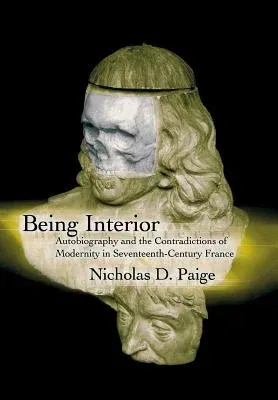Nicholas D Paige
(Author)Being Interior: Autobiography and the Contradiction of Modernity in Seventeenth-Century FranceHardcover, 12 December 2000

Qty
1
Turbo
Ships in 2 - 3 days
In Stock
Free Delivery
Cash on Delivery
15 Days
Free Returns
Secure Checkout

Part of Series
New Cultural Studies
Print Length
312 pages
Language
English
Publisher
University of Pennsylvania Press
Date Published
12 Dec 2000
ISBN-10
0812235770
ISBN-13
9780812235777
Description
Product Details
Author:
Book Format:
Hardcover
Country of Origin:
US
Date Published:
12 December 2000
Dimensions:
23.39 x
15.6 x
2.06 cm
ISBN-10:
0812235770
ISBN-13:
9780812235777
Language:
English
Location:
Philadelphia
Pages:
312
Publisher:
Series:
Weight:
639.56 gm